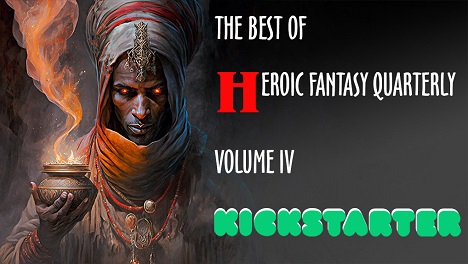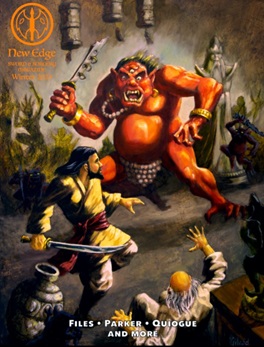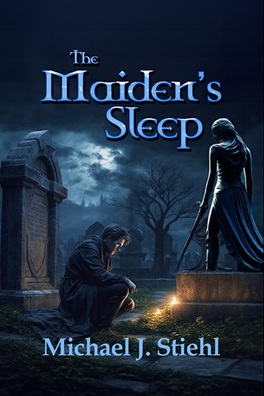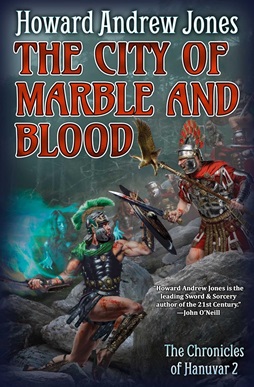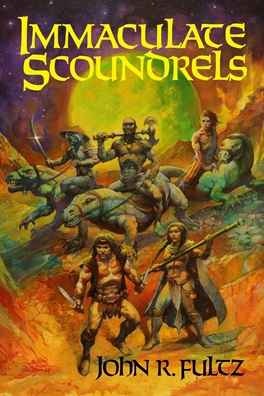THE LAST FREE BEAR
THE LAST FREE BEAR, by J.S. Bangs:
The white bear stalked Tupiak across the ice, just as Tupiak stalked the twisted men. He did not see the bear except once or twice, a long ways off, as an ivory‑colored shape in the snow.
The path of the twisted men ran in a straight line to the south. The pale light of the unrising sun reflected in the tracks of their sleds and the footprints they and their dogs trampled in the frost. It was easy to follow them, but they moved more quickly than he. He had no sled; his dogs had been slaughtered by the twisted men, their bodies strewn in the snow. And the twisted men did not sleep. He himself had not slept for two days, measured by the times when the horizon grew bright and the winter‑shy sun threatened to appear over the ice. But eventually the twisted men would stop, for they still had to eat, and Tupiak’s captured family would slow them whether they rode the sleds like children or were driven before them like slaves. And when they stopped, he would come upon them as upon sleeping seals, and he would destroy the twisted men.
That is not what happened. Instead, he found the bear.
The track of the twisted men avoided a steep drift. Tupiak found it was hard with ice and held his weight, so he climbed it. His foot broke through the crust on the far side. He did not strike snow, but fur, and the ice fell away from a shallow den. A bear lay before him, awake but unmoving.
He raised his spear. His strength had waned, and he had but one chance to slay it. But if he ate it, he would take its strength and walk again for many days.
“Was it you I followed?” the bear asked.
Tupiak stayed his strike. He had never before spoken to a bear. “A bear followed me,” he said. “If not you, it was another.”
“It was me. Yesterday I saw you were not one of the twisted men, so I left you alone and went on ahead. But if you will kill me, strike and be swift. I have no strength to fight you.”
Tupiak waited. “Why are you following the twisted men?”
“At the start of winter they took my cubs.”
Tupiak lowered his spear. “Then I will not kill you. Why are you weak?”
“I have not eaten in many days. Last night I found a seal’s hole and waited there for it, but it did not come.”
“Where was the hole?”
“East of here.”
Tupiak walked to the east a quarter of the night before he found the hole, a black gap in the blue ice. He waited until he saw the ringed seal rise to breathe, and he struck true. He carried the carcass whole to the bear.
The sky was all dark again when he arrived. The bear slept. Tupiak woke her with a piece of warm blubber laid upon her face.
“What is this?” she asked.
“The fat of the seal I slew. Eat it and take its strength.”
The bear rose and ate the seal fat. They shared the flesh, and the bear ate the heart and the liver. Tupiak greased his mukluks with the fat, then cut out the rest to carry for later. The bear rose with a groan and sat on her haunches, scratching a cheek with her claw.
“Why did you bring me food?” she asked.
“You also are a hunter, and you pursue the twisted men.”
She bowed her head. “I am Reddens The Snow Beside The Kill. Will you offer me your name?”
“No. The twisted men steal names to corrupt their bearers.”
“Then will you tell me what interest you have in the twisted men?”
Tupiak was quiet for a long time. He rose and stretched and felt the strength of the seal fill him, warming the fur that lined his anorak and nimbling his fingers in his mittens. He took up his obsidian‑pointed spear and he began to follow the tracks of the twisted men to the south. The white she‑bear loped beside him.
“Two days ago I returned from hunting,” Tupiak said, “and found that my family was gone. Taken, like your cubs, by the twisted men. I have followed their track since then. Now tell me the truth. I have seen white bears fighting alongside the twisted men in their wars against my people, and they were savage and cruel. Why do you fight against them?”
The bear roared with anger. She reared upon her hind legs, blotting out the light of the stars, and beat her chest. Then she fell to the snow and began to weep with short, high snorts.
“Those were the great bears that have been corrupted,” she said, “as the twisted men are the corruption of your kind. My cubs have been taken to be made like them.”
“But all the bears I have ever seen were so. I have never met a bear that spoke with the tongue of men.”
“That is because I am the last free bear. If my cubs are taken there will be no more.”
Tupiak quieted to respect the grieving bear. His own heart was heavy with the memory of his wife and child. They passed an hour with no sound besides the crunch of their feet in the snow. Then he said, “Reddens The Snow Beside The Kill, my name is Tupiak.
* * *
They walked for thirty days to the south. When they grew hungry the bear hunted, or Tupiak hunted, and the ice always blessed them with food. They seldom spoke, but at night they slept curled together in a shallow den. Grains of ice stung Tupiak’s face, but his hands were warm in the bear’s fur.
As the horizon lightened and the sun prepared to rise for spring, they spied in the distance a line of black. The she‑bear chuffed and sat on her haunches.
“What is that?” she asked.
“Those are trees,” Tupiak said.
“Trees? I have never seen trees. I have heard that they are like the tundra flowers, but tall enough to reach the sky. I have heard that not even a great bear may strike them down.”
“That last is true, but I do not think they are much like tundra flowers. You’ll see when we get closer.”
She sniffed the air, then sniffed at the tracks in the snow. “We are close to the twisted men.”
Tupiak nodded. “They rest now that they have reached the safety of the trees. They think we will not follow them.”
“Do you know their destination?”
“You do not?”
The she‑bear shook her head.
“Further to the south,” Tupiak said, “when you have reached the place where you see no ice, but only trees as far as each horizon, you may catch sight of a black hillock with steam rising from its crown. When you approach it, it grows and flees from you, until you see that it is a great mountain rising out of the forest, dark as obsidian, and there is fire in its breast. There the great sorcerer made his fortress and began to corrupt all people.”
“We white bears do not remember any such thing. We have never come as far south as the forests.”
“We remember,” Tupiak said. “Once the free people of the north traded with the people of the forest and counted them our friends. What I know of the forest is what my grandfather told me of that time. But they since have fallen under the shadow of the sorcerer and become twisted men.”
The she‑bear walked after the tracks of the sleds again. “We bears know only that evil things began to come from the south. Dire wolves and bears made monstrous, and the twisted men that came with them. But the free bears struggled against them, even as we dwindled and were slain, and our cubs were stolen.”
“We free men did the same.”
They walked a little ways farther. “Sometimes we blamed all men for the evil that destroyed us. Sometimes we slaughtered a man when we needed not his strength, without concern for whether he was twisted.”
“We also too took all bears for our enemies. I thought that you stalked me to kill me on the ice.”
“And so I did. Our lore says that if a bear eats the flesh and the heart and the liver of a hunter, she will gain his cunning. I stopped only when I saw you were not a twisted man.”
For a moment they regarded each other as two hunters who live on flesh. They followed the tracks of their prey in silence. After a while Tupiak put his hand in the bear’s fur. She licked his face and he smelled her hot breath. They followed the track into the edges of the forest.
The she‑bear went to the trunk of an ancient spruce. She raked her claws across the bark and sniffed at the sap. “It smells clean, like the tundra mint.” She tasted the needles and growled happily. “I like the forest. I don’t see why it should be evil.”
“Only the sorcerer is evil,” Tupiak said. “The forest is innocent.”
The bear scratched her back against the tree, then trotted down the track of the sleds without a word. Tupiak followed her. They walked in silence for several hours.
The trees grew denser and closed around them, roofing the world with frosted needles, and swallowing the crunch of their footfalls. The tracks laid by the runners weaved between the trees, and were confounded with the footprints of men and beasts. Tupiak stopped and examined the shape of the marks with consternation.
“Dire wolves are here,” he said.
The bear snorted in agreement. “I smelled them join the twisted men a few miles back. But they are few.”
Tupiak eyed the shadows between the trees warily. On the tundra or the plains of ice, an enemy could be seen from far away. Here, the trees darkened the sky and hid shadows and evil things. The bear, too, looked at the forest with suspicion. She glanced behind them, back towards the comfort of the open, wind‑scoured tundra.
“I regret what I said about liking the forest,” the white bear said. “The trees are not evil, but the forest is.”
“Only a little while more,” Tupiak said.
* * *
The attack came in the brightest part of the winter day, when the sky was pink all around with the light of the feeble sun. The air was still and carried no scent. Tupiak saw a gray shape move in the forest. He told the bear to stop. She sat on her haunches, sniffed at the air, and licked her nose.
The wolves burst from the shadows of the trees.
A wolf bowled Tupiak to his back, its teeth tearing at the sleeves of his sealskin anorak. The gray shape was thrown away with a roar, and the she‑bear’s ivory fur appeared in a blur above him. Tupiak scrambled to his feet and recovered his spear. Four wolves harried the bear. She swiped at them with bitter claws, but they twisted away and leapt upon her back.
Tupiak thrust his spear through the ribs of one wolf. It crumpled to the ground and stained the snow red. The other three turned on him. He scored a gash in the side of one, and the she‑bear swatted it away. The other caught his hand in its jaws and pulled him to the ground. Before the bear could turn, the second wolf lunged at Tupiak’s exposed face and tore at his cheeks with its teeth and claws. Tupiak pushed, but his spear was gone. The jaws of the wolf at Tupiak’s wrist crunched and ripped his hand from his body.
The bear’s teeth closed on the neck of the wolf at Tupiak’s face. She shook him like a child shakes a bone rattle, then tossed the body to the side. The wolf did not move from where it had landed. The other took Tupiak’s hand in his mouth and fled into the woods.
Tupiak did not rise. The bear nudged his arm. “Get up.”
He moaned and twitched. The bear put a nose beneath his shoulder and rolled him onto his back. His right eye was crushed, and blood flowed from his face and soaked the fur lining of the anorak. Reddens The Snow Beside The Kill licked his ruined face. Tupiak felt the stench of her breath and stirred. His remaining hand groped blindly and seized her fur.
“Lean into me,” she said. “Cling tight to my fur, and I will carry you.”
He lurched to his knees and fell against the bear’s shoulder. With a grunt she heaved him over her back, where he clasped her fur with his remaining hand. His feet feebly treading the snow, they staggered forward a few paces at the time. Their path was marked by the blood that drizzled from the stump of Tupiak’s hand
When nightfall came, Tupiak fell into the snow and did not get up.
“I have no more strength,” he said.
“We haven’t yet reached the twisted men,” Reddens The Snow Beside The Kill said.
“My eye is gone. My hand is gone. I am no longer a hunter.”
The bear sat and regarded him. “We are very close,” she said. “I can smell them nearby. There are no more wolves with them, and without the wolves’ noses they have no way of knowing that we still follow.”
“It doesn’t matter. I cannot rise to fight.”
“You were a true warrior,” the bear said. “I will save your wife and your child if I can.”
Tupiak was quiet. Between the wide boughs of the trees he watched the stars wheel through the winter sky. The bear lay next to him and warmed him with her body.
Dawn approached, the first dawn that meant the end of winter. Tupiak said, “You will need great strength, even to fight against a few men.”
“I have great strength,” the she‑bear said. “I have the sorrow of my stolen cubs and the fury of the free bears that have perished.”
“You will need the cunning of a hunter, and the hope of the free men who are perishing.”
The bear looked with Tupiak into the sky, and watched the stars turn and fade with the coming of true dawn. She touched her nose to his forehead and licked his face.
“Tell my wife that I came for her,” Tupiak said. The bear nodded.
Her jaws crushed his neck so he died in a moment. She devoured his flesh and his heart and his liver, and when she rose she surveyed the forest with the cunning of a hunter and the hope of the free peoples.
A little to the south she smelled the fetor of the twisted men, the fear of the human captives, and her own wounded cubs. Though her bear’s heart wished to rush in all at once, her hunter’s mind knew the way they had laid their tents, where their dogs slept tethered, and how she might come upon them unawares.
She stalked through the woods with rage and cunning to destroy the twisted men.
___________________________________________________________________________________________
J.S. Bangs lives and works in the Pacific Northwest with his wife and two boys. During the day he’s a mild-mannered computer programmer, but during the evenings he slays princesses and rescues dragons. You can see more at his site http://jsbangs.wordpress.com.
